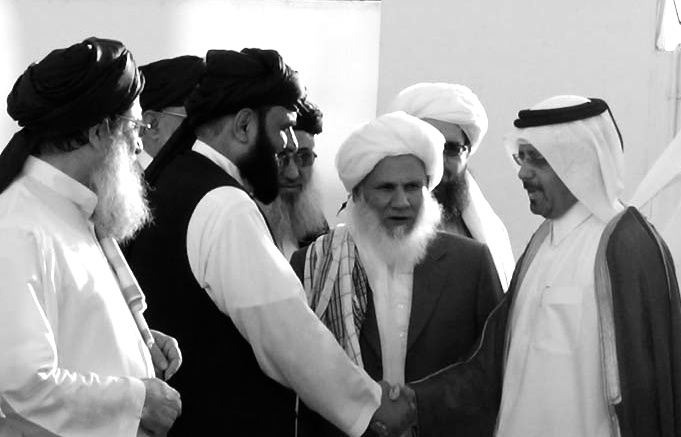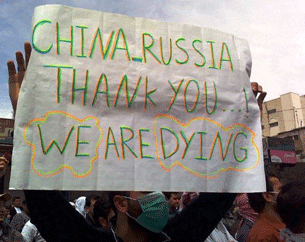On June 15, 2013, the Taliban finally found an actual address in Doha, Qatar. Ostensibly, informal negotiations are going on from that address between the US administration and the Taliban. Let’s not forget that the Taliban doesn’t have an established hierarchy. They consist of many small groups of between 10 to 25 fighters, where each group operates independently. So, it would be a mistake to argue of a unified representation of the Taliban. But who are the delegates in the Doha office that came forward representing the Taliban in Afghanistan? Are they representatives of the Pakistan’s Inter-Services Intelligence (ISI), as Amrullah Saleh, former director of Afghanistan’s intelligence service has suggested? Or are they the rightful representatives of the Taliban?
The Doha office has a staff of eleven, all of whom served in mid to high-ranking positions during the Taliban government between 1996-2001. After the fall of the Taliban, they have been active in waging war against the USA, NATO and Afghan forces.
In Doha, Taliban’s chief negotiator is Syed Mohammad Tayab Agha. He received an education in religious studies in the city of Quetta in Pakistan. He was a former diplomat in Islamabad during the Taliban regime and in his last position he served as Chief of Staff for the Taliban’s supreme leader Mullah Omar in Kandahar. Although he wasn’t present on the opening day of the office, his colleagues reiterated his stance that there are no plans for a cease-fire so far and if there are to be any negotiation they should recognize Islamic Emirate of Afghanistan at first.
[captionpix align=”right” theme=”elegant” width=”300″ imgsrc=”http://natoassociation.ca/wp-content/uploads/2013/07/istqbal-e1372948327880.jpg” captiontext=”From the right to left: Maulawi Shahabuddin Delawar, Qari Din Mohammad Hanif, Shir Muhammad Abas Stankizai, Zabiullah Mujahid, Maulawi Jan Muhammad Madani, Sheikh Sayed Rasoul, Haji Mohammad Zahid Ahmadzai, Maulawi Nek Mohammad.”]
Tayeb Agha is assisted by Maulawi Shahabuddin Delawar, former Taliban ambassador to Islamabad and later a senior diplomat in Saudi Arabia; Maulawi Jan Muhammad Madani chief editor of the Taliban Arabic propaganda magazine Al-Samud; Mohammad Sohail Shaheen, a Taliban spokesperson who is well-known by his nickname “Zabiullah Mujahid”; Sheikh Sayed Rasoul who served as head of the Peshawar Council of the Taliban; Shir Muhammad Abas Stankizai, the Taliban’s former deputy minister of foreign affairs; and Qari Din Mohammad Hanif, who was the interlocutor of the Ashgabat peace talks between the Northern Alliance and the Taliban in 1999. In between there are three lesser-known names: Dr. Mohammad Naeem Wardak, Hafiz Azizur Rahman, and Haji Mohammad Zahid Ahmadzai.
Looking into the background of the Doha staff, a few facts come to our attention. All of the delegates studied in religious Madrasas in Pakistan. They served in diplomatic posts in Pakistan or Arab countries during the Taliban regime. They belong to the radical section of the Taliban movement and after the fall of the Taliban they lived in Arab Gulf states or in their hideouts in Pakistan. Their ties with Pakistan are undeniable, giving us an indication that whatever the process and outcome of the negotiation would be, Pakistan will be the key player.
In profession, half of the delegation has worked or are working in the Taliban’s public relations apparatuses. They are responsible for promoting the image of the Taliban as seeking peace with all countries around the world and claiming that they would not allow Afghan soil to be used as a launching pad to threaten other countries. At the same time, they have been the voice of the Taliban’s cruelty as well, giving us every confirmation of suicide attacks, killing of our soldiers or poisoning of Afghan schoolgirls. The other half of the team has been active in raising fund, recruiting Arab fighters, and expanding the Taliban patronage network among the Arab Sheikh’s.
Accepting that this office will be used only for the purpose of peace talks would be a mistake. In fact the Taliban has been clear about their objectives from the office in Doha, reiterating that the office will be used “to initiate talks with all countries and [improve] relations with them,” “to end the occupation of Afghanistan and establish an independent Islamic system,” to “hold meetings with Afghans and to initiate contact with the United Nations, regional and global NGOs” and finally “to put out [the Taliban’s] political statements to the media on the current political developments.” To pursue these objectives, with the office in Doha the Taliban got what they longed for so long; an internationally recognized platform from which they could preach their message and gain easier access to funds, intelligence and radical Arab fighters. And having the above team, it doesn’t seem unrealistic that they will achieve those goals.
While the US administration and the Afghan government wait for the Taliban’s response to their invitation to open formal negotiations in Qatar, it would be in their best interest to know who will be sitting on the other side of the bargaining table. Then again, even if you know them, are they the real decision makers in the Taliban movement? This is something that we have to wait to see as the trail of the talks with Taliban unfolds.



